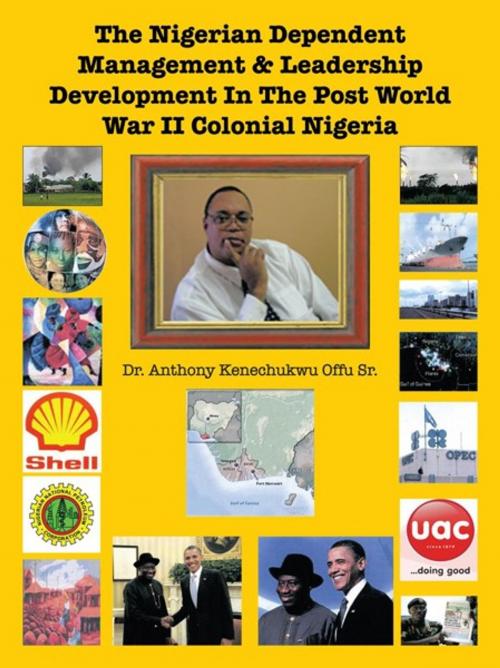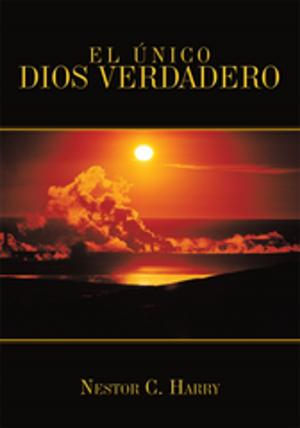The Nigerian Dependent Management & Leadership Development in the Post World War Ii Colonial Nigeria
Nonfiction, Social & Cultural Studies, Political Science, Politics, Economic Conditions, Social Science| Author: | Dr. Anthony Kenechukwu Offu Sr. | ISBN: | 9781477294338 |
| Publisher: | AuthorHouse | Publication: | January 4, 2013 |
| Imprint: | AuthorHouse | Language: | English |
| Author: | Dr. Anthony Kenechukwu Offu Sr. |
| ISBN: | 9781477294338 |
| Publisher: | AuthorHouse |
| Publication: | January 4, 2013 |
| Imprint: | AuthorHouse |
| Language: | English |
The main theme of this book is to provide a critical analysis of the Nigerian dependent management and leadership development in the post world war II colonial Nigeria. (1945-to-1960) and beyond, using foreign fi rms-global/multinational and transnational corporations; U.A.C., SHELL, NNPC and OPEC. All these foreign fi rms have their parent companies resided in their foreign countries of origin (advanced metropolis) and have their subsidiaries or peripheries all over the global communities of underdeveloped and developing economies. Paradoxically, the book was generated by on-going political, economic concern and controversy with the fate of the struggle and quest for economic liberation in the third world-under-developed and developing countries of Africa, with direct specifi c studies of the Nigeria dependent management and leadership development, predates, from pre and post colonial era of the British colonial rule in Nigeria. The book further focuses, elicits and elucidates the third world dependent development. International Political Economy and Global/Multinational-Transnational Corporations, economic and political roles in Nigerias agricultural and oil base economic factors, by using Nigeria raw materials/natural resources to produce into fi nished products. The profi ts maximization, surpluses and heavy taxation realized through levied and derived from the genesis of the raw materials, making it into complete fi nished products, from the subsidiary country Nigeria, by the British global/multinational corporations of (U.A.C.) the United Africa Company, on the poor peasantry/farmers were been appropriated, expropriated back to the U.A.Cs parent company in the United Kingdoms ministry of food and supply. The other raw materials/natural resources of the crude petroleum/oil manufacturing economy were been monopolized by the SHELL Oil Royal Dutch of Netherlands and British SHELL post emerged, based on the concession signed in Britain, as the British government during colonial rule in Nigeria discovered crude oil segments deposits, in the todays south-south at Oloibiri in 1956, province/region in the today, south-south of eastern Nigeria. The NNPC the Nigeria indigenous oil transnational corporation, represented the Nigeria federal government crude oil reserve ownership of 55 % (in a shared venture, with SHELL British Petroleum and her partner of the Netherland Royal Dutch Oil Co-SHELL- SHELL owned 30 %) and profi ts made by SHELL was transferred to the SHELL parent oil Co, Headquarters at Hague, Netherland; Finally, the OPEC relationship with Nigeria, and the world oil market, emerged as the oil giant (developing oil organization) permanent inter-governmental organization, seemed competitively world oil organization, bailed out the global oil community in terms of world oil market stock exchange crashes and recessions; global oil gluts, oil embargos, regional civil wars and unrest threatened OPEC oil production, intercepts in bailing out the global oil community, via by optimal production and supplies was apparent in OPEC sustainability growth and reinforce the world oil market business continuity. OPEC main theme was apparently formed to stabilize and fi x oil prices, amongst the member 12 oil producing and exporting countries from the third world. Assist the member oil producer member countries to produce oil in a quota basis system to prevent any oil price manipulations, intimidations, exploitative mechanism of oil sales malpractices and price anomalies.
The main theme of this book is to provide a critical analysis of the Nigerian dependent management and leadership development in the post world war II colonial Nigeria. (1945-to-1960) and beyond, using foreign fi rms-global/multinational and transnational corporations; U.A.C., SHELL, NNPC and OPEC. All these foreign fi rms have their parent companies resided in their foreign countries of origin (advanced metropolis) and have their subsidiaries or peripheries all over the global communities of underdeveloped and developing economies. Paradoxically, the book was generated by on-going political, economic concern and controversy with the fate of the struggle and quest for economic liberation in the third world-under-developed and developing countries of Africa, with direct specifi c studies of the Nigeria dependent management and leadership development, predates, from pre and post colonial era of the British colonial rule in Nigeria. The book further focuses, elicits and elucidates the third world dependent development. International Political Economy and Global/Multinational-Transnational Corporations, economic and political roles in Nigerias agricultural and oil base economic factors, by using Nigeria raw materials/natural resources to produce into fi nished products. The profi ts maximization, surpluses and heavy taxation realized through levied and derived from the genesis of the raw materials, making it into complete fi nished products, from the subsidiary country Nigeria, by the British global/multinational corporations of (U.A.C.) the United Africa Company, on the poor peasantry/farmers were been appropriated, expropriated back to the U.A.Cs parent company in the United Kingdoms ministry of food and supply. The other raw materials/natural resources of the crude petroleum/oil manufacturing economy were been monopolized by the SHELL Oil Royal Dutch of Netherlands and British SHELL post emerged, based on the concession signed in Britain, as the British government during colonial rule in Nigeria discovered crude oil segments deposits, in the todays south-south at Oloibiri in 1956, province/region in the today, south-south of eastern Nigeria. The NNPC the Nigeria indigenous oil transnational corporation, represented the Nigeria federal government crude oil reserve ownership of 55 % (in a shared venture, with SHELL British Petroleum and her partner of the Netherland Royal Dutch Oil Co-SHELL- SHELL owned 30 %) and profi ts made by SHELL was transferred to the SHELL parent oil Co, Headquarters at Hague, Netherland; Finally, the OPEC relationship with Nigeria, and the world oil market, emerged as the oil giant (developing oil organization) permanent inter-governmental organization, seemed competitively world oil organization, bailed out the global oil community in terms of world oil market stock exchange crashes and recessions; global oil gluts, oil embargos, regional civil wars and unrest threatened OPEC oil production, intercepts in bailing out the global oil community, via by optimal production and supplies was apparent in OPEC sustainability growth and reinforce the world oil market business continuity. OPEC main theme was apparently formed to stabilize and fi x oil prices, amongst the member 12 oil producing and exporting countries from the third world. Assist the member oil producer member countries to produce oil in a quota basis system to prevent any oil price manipulations, intimidations, exploitative mechanism of oil sales malpractices and price anomalies.















